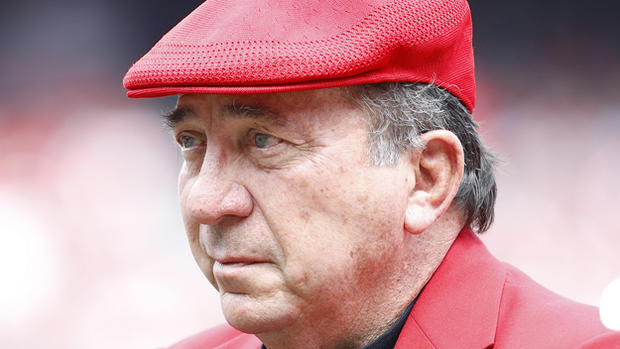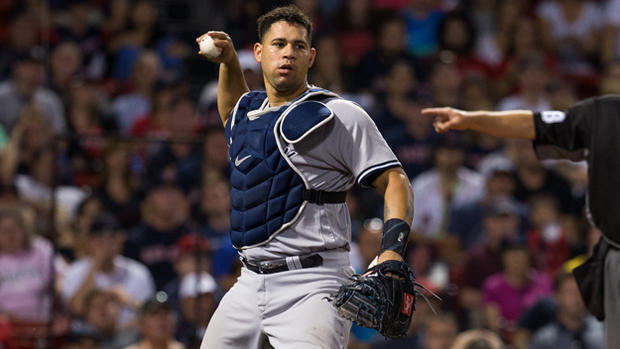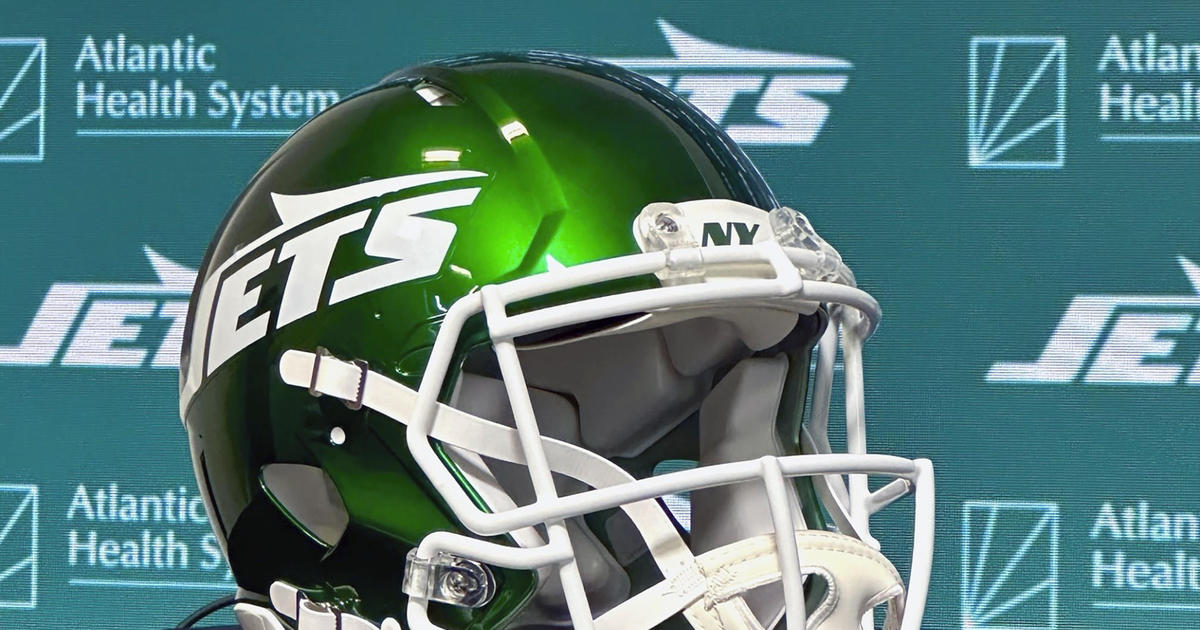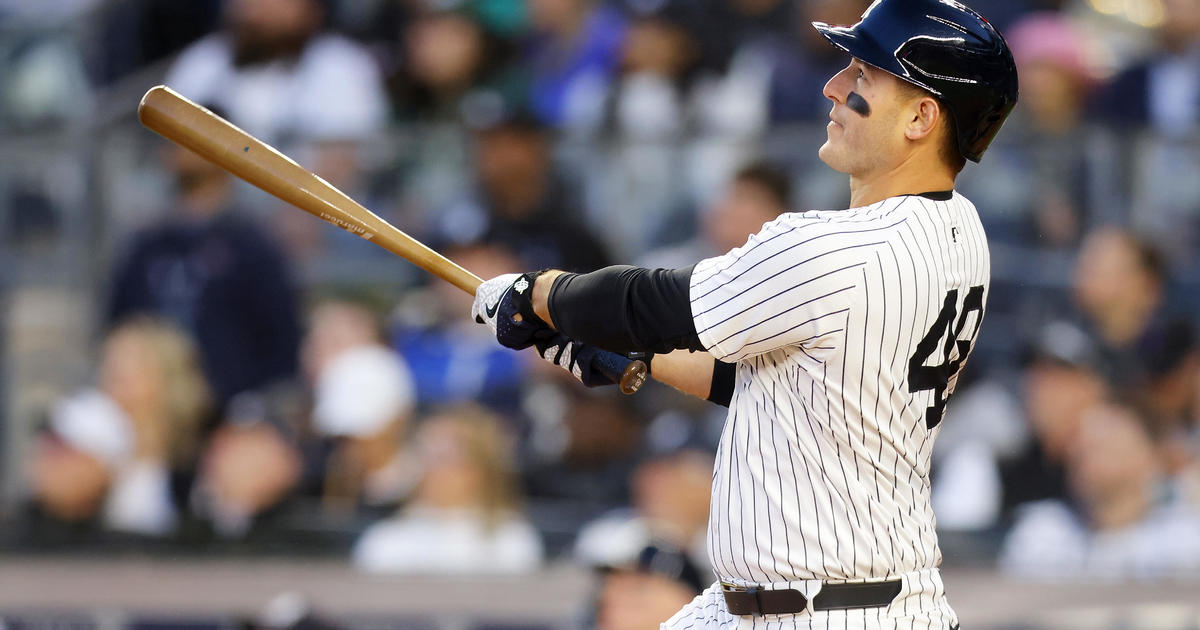Sweeny: Sanchez's Struggles Behind Plate Aren't Unique -- Just Ask Johnny Bench
By Sweeny Murti
» More Columns
Once upon a time, there was a young catcher with amazing power at the plate and a cannon for an arm. The future seemed limitless.
And in his first full year in the majors, he led the league in passed balls.
His name was Johnny Bench.
Today we know him as "Hall of Famer, Maybe the Best Two-Way Catcher Ever Johnny Bench." But as a 20-year-old rookie in 1968, Bench led the National League with 18 passed balls while also battling 55 wild pitches. The next year, he had 14 passed balls and 63 wild pitches.
"I'm amazed it was that many," Bench told me in a recent phone interview. "I would never have believed I had that many."
MORE: Sweeny: Maris Family Rooting Hard For Stanton To Pass 61
While Bench (jokingly?) blames Jim Maloney's spitball for more than a few of those, the young Cincinnati Reds catcher had some work to do behind the plate, and within a couple of years, it paid off.
By 1972, the passed balls had been reduced to two. And in 1975, Bench caught 1,002 innings without a single passed ball. How did he make such a dramatic improvement?
"I learned to catch every ball," Bench said.
That's actually the title of a book Bench authored — "Catch Every Ball: How to Handle Life's Pitches."
And that's actually Bench's simple advice to Gary Sanchez, the Yankees superstar catcher who leads the American League in passed balls with 15 and, despite gaudy offensive numbers and a cannon arm, has taken some heat for his subpar work behind the plate.
"You have to learn how to catch every ball," Bench said. "If you catch every ball, people will say, 'Wow what a great catcher! He catches everything!'"
MORE: Sweeny: Keen Eye, Deep Knowledge Of Baseball Paved Way For Stick's Success
It sounds simple, but Bench contends that pitch framing is a fancy way of saying catch the ball with most of your glove still over the plate. But catch the ball first, because "by the time the ball gets to 6 inches in front of the plate or the middle of the plate, the umpire has already made up his mind" if the pitch is a strike or a ball, regardless of how it's caught.
Bench said that he doesn't watch the Yankees all that much, but he's aware of what Sanchez has done the last two years and knows why manager Joe Girardi went out of his way to call out Sanchez's defensive struggles last month.
"He's not doing what Joe wants him to do, and Joe can see the greatness that (Sanchez) has," Bench said. "So Joe is trying to make it work. (He wants) Gary to become better, that's all. My gosh, aren't you thrilled when somebody wants you to be better?"
And Bench - -who went on to win 10 Gold Gloves and two MVP awards, led the NL in home runs twice and RBIs three times, led the Big Red Machine to four pennants and two World Series championships and became a first-ballot Hall of Famer in 1989 — knows that Sanchez is good enough to make the adjustment and, in the meantime, let his bat talk back for any shortcomings he has behind the plate.
"Is he going to be the greatest defensive catcher?" Bench asked. "Time will tell on that. But there's a hundred guys out there that can really catch. If that's what you really want, you can go out and hire all that you want. They're not going to hit 50 home runs, and they're not going to drive in 100 runs. But you've got to have some of the bad with (Sanchez's bat).
MORE: Yankees Beat Rays 3-2, Take 2 Of 3 At Citi Field
"All Joe is saying is, 'Gary, you can be better.' And there's nothing wrong with that. Joe is just trying to make him better. That's a compliment to Gary. There's nothing wrong with Joe saying that. And it's up to Gary to go out there and say, 'Hey, I do need to work on it. I'm fine with that.'"
The catcher's top priority is game-calling. "That's your main objective," Bench said. "You have to get a win for that pitcher and for the team."
Next for Bench, in order: hitting, throwing out runners and blocking the plate.
The last one has been taken away by the Buster Posey Rule. But Sanchez is obviously quite adept at hitting and throwing, just like Bench (389 career home runs, plus 10 more in the postseason, and a 43 percent caught-stealing percentage in more than 1,700 games behind the plate).
Just catching the ball is a big part of calling the game and giving the pitcher confidence on the mound.
"The mental side of getting everything out of that pitcher and knowing how every at-bat (in a game) is important," Bench said. "Your focus has to be so laser in calling a great game."
And more focus on simply catching the ball will go a long way toward cutting down on the passed balls.
The wild pitches — Sanchez has seen 47 of those this year — are a different matter. Bench saw 118 of those in his first two years and says that's more about the pitchers, not the catchers.
"If the guys kept bouncing it in the dirt, I picked up and threw it back to them harder than they threw it to me," Bench said, not really laughing, either. "Stop throwing it in the dirt. I'm not supposed to be blocking this stuff.
"How about the wild pitch is not the catcher's fault? When (the pitcher) throws a curveball and it rotates and it hits (the ground) going one way, and then it actually hits the seams and goes back the other way."
Bench explained that every slider doesn't move the same way for a pitcher, sometimes pitch to pitch. Or a fastball might move differently because the pitcher put a little more pressure on the seam, a two-seamer decides to cut instead of fade, or any number of other things about a pitcher's mechanics that cause pitches to not do what they are supposed to do.
"Give some (blame) to the catcher and let's give a lot to the pitcher for doing something different than what he was supposed to," Bench said. "These are major league pitchers, the best pitchers in the world. I'm going to call the signal, I'm going to set up, I'm going to have my glove right where it should be … but once he releases it, you're done with."
But, of course, the burden will always fall on the man behind the mask because his position is also his job description.
"It's not always the catcher's fault," Bench said. "But it's our responsibility."
And so the focus will remain on Sanchez and his defense as long as he mans the position. And no matter how much he improves and no matter how long he goes between balls that get past him, the next time one does, the attention goes back to Sanchez and what he is and isn't doing right behind the plate.
I asked Bench if criticism of that kind ever bothered him as a player.
"Three words of life: 'Get over it,'" Bench said. "What, you can't take criticism? We don't like it. It hurts our feelings. What do we do? We try to get better."
And better doesn't mean perfect.
"Some guys are unbelievable and nothing ever gets by them, and some guys aren't as good," Bench said, noting it's not any different for other players. "Some pitchers give up home runs, some infielders make errors."
Bench knows Sanchez carries a big bat and a big arm, and those will serve him well. Now it's just about continuing to learn and improve.
"It's not an overnight thing," Bench said. "You learn to catch the ball."
Please follow Sweeny on Twitter at @YankeesWFAN





